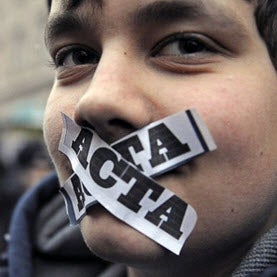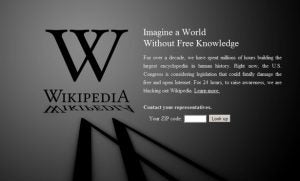Big Brother: How ACTA Brings SOPA’s Threat to a Global Scale

“The thought police would get him just the same. He had committed – would have committed, even if he had never set pen to paper – the essential crime that contained all others in itself. Thoughtcrime, they called it. Thoughtcrime was not a thing that could be concealed forever. You might dodge successfully for a while, even for years, but sooner or later they were bound to get you.“
– George Orwell, ”1984”, Book One, Chapter One
On 20 January 2012 in the United States Congress’s lower chamber, Rep. Lamar Smith, sponsor of the ‘Stop Online Piracy Act’ (SOPA) said he would postpone consideration of the legislation and delay the Senate vote on its counterpart, the ‘Protect IP Act’ (PIPA). The decision was heralded as a victory for free speech and net neutrality, helped by a high profile blackout of websites from the likes of Google, Wikipedia, Mozilla and WordPress. It was a battle, it was not the war.

SOPA has a big brother, it is called ACTA (the ‘Anti-Counterfeiting Trade Agreement’) and 24 hours after SOPA was derailed in Congress ACTA was signed off by the European Union and 22 member states, including the UK. A signing ceremony on 1 October 2011 had already garnered the signatures of Australia, Canada, Japan, Morocco, New Zealand, Singapore, South Korea and yes, the United States. ACTA would make SOPA irrelevant by establishing an international legal framework and global governing body for the enforcement of intellectual property. It would be able to work outside international institutions such the World Trade Organization, the World Intellectual Property Organization and the United Nations.
Excluding its accountability, the theory behind ACTA is sound: commonly agreed laws, crack down procedures on counterfeit goods (including generic imitations) and approved legal recourse could well simplify the chaotic and occasionally brutal actions currently taken. Unfortunately there is a problem: ACTA appears to be rotten to the core. We say ‘appears’ for the simple reason that since ACTA was first announced (way back in October 2007) very little of its content has been made public since it was created by unelected industry negotiators and lobbied directly to politicians. What has been revealed makes for disturbing reading:
“ACTA allows for the monitoring of Internet users without initial suspicion, the handing over of their personal data to rights holders on the basis of mere claims and the transfer of this data even to countries without adequate data protection… This makes the entire Agreement, in our opinion, incompatible with fundamental European human rights instruments and standards.”
-European Green Party, November 2011


